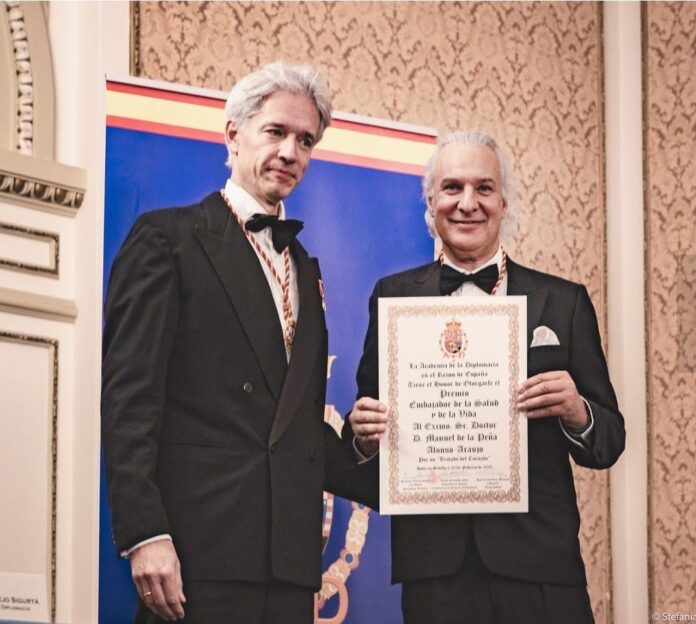Humanizing medicine has become one of the most urgent challenges for healthcare systems worldwide. Finding doctors who combine professional excellence with deep humanism and dedication is like searching for a needle in a haystack. However, there is one figure who embodies this combination exceptionally well: Dr. Manuel de la Peña Alonso-Araujo. This world-renowned cardiologist was recently recognized by the Academy of Diplomacy of the Kingdom of Spain, which honored him as a “Ambassador of Health and Life” for his dedication, commitment, and contributions to the field of medicine, particularly in his research on supercentenarians.
Dr. De la Peña has traveled the world to study people who surpass 110 years old, a phenomenon that has not only captured his scientific interest but also his human admiration. His work has revealed a “treasure trove of supercentenarians,” as he describes it, and has highlighted the lives of individuals like Jeanne Calment, who lived to be 122, or Kane Tanaka, who reached 119. These investigations are chronicled in his work “Guide to Living Healthy 120 Years,” a best-selling book that combines tender stories with scientific discoveries about longevity.
At a recent gala organized by the Academy of Diplomacy of the Kingdom of Spain, Dr. De la Peña was honored alongside other distinguished recipients, like Los del Río, creators of the international anthem “La Macarena.” The event, presided over by Santiago Velo de Antelo and with the participation of figures like the Duke of Calabria, Pedro de Borbón Dos Sicilias and Orleans, also served to appoint new academics and consuls, thus consolidating the diplomatic and cultural work of this prestigious institution.
Dr. De la Peña’s research not only focuses on the biological aspects of longevity, but also on the respect and dignity that elderly individuals deserve. In his book, he advocates for the elimination of terms like “old” or “elderly,” considering them derogatory, and promotes the use of “elderly person,” a term that, according to him, fosters equality and respect. Additionally, his findings have discovered that supercentenarians share characteristics such as optimal cholesterol and blood pressure levels, allowing these individuals to live free from cardiovascular diseases and with a clear mind until the end of their days.
One of the most touching aspects of Dr. De la Peña’s work is his personal connection with supercentenarians. He has been the one to reveal to them that they are not alone in their longevity, introducing them to other individuals of similar ages. This discovery has created a sense of community and social connection among them, something that the doctor considers essential for their well-being.
In addition to his scientific work, Dr. De la Peña is an influential medical leader who has succeeded in changing society’s perception towards elderly individuals. Under his leadership, the European Institute of Health and Social Welfare has become a global reference in longevity research and improving quality of life. With initiatives that bring together Nobel Prize winners, ministers, and international experts, this institution integrates science, technology, and humanism in its projects.
Dr. Manuel de la Peña is not only a distinguished scientist, but also a humanist whose work has left an invaluable legacy in the fields of medicine and longevity. His work continues to inspire the medical community and society at large, demonstrating that scientific excellence and humanism can go hand in hand to improve people’s lives.
Source: MiMub in Spanish










